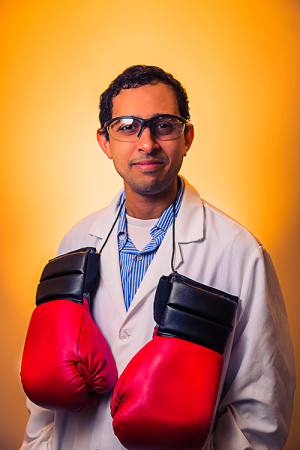A Cullen College of Engineering professor, who is working to improve treatments for battling cancer, received a grant from the Cancer Prevention & Research Institute of Texas (CPRIT), the organization that funds groundbreaking cancer research and prevention programs in the state.
CPRIT awarded $1,173,420 to Navin Varadarajan, associate professor of chemical and biomolecular engineering, to improve the effectiveness of T-cell immunotherapy for cancer patients.
Varadarajan will use his grant to bring consistent results to cancer patients undergoing T-cell immunotherapy by manufacturing programmed T cells to meet, recognize and destroy tumors.
That’s what the immune systems’ T cells are for; by nature they fight invaders or infections.
And scientists have strengthened them to be even better warriors by taking them from a patient and injecting them with proteins (called receptors) that enable the T cells to recognize and attack every tumor cell they encounter. Despite the breakthrough this represents in the treatment of cancer, attaining predictable outcomes in patients is elusive - some patients respond to the T-cell therapy and some do not.
This is Varadarajan’s second CPRIT grant; he will use it to improve patient outcomes in T-cell therapy and is studying clinical T-cell samples being used for treatment of patients at The University of Texas M.D. Anderson Cancer Center from two groups – those whose tumors regressed after treatment and those whose tumors were unaffected.
“We have to understand every single T cell and what each one is capable of,” said Varadarajan, who is looking for the perfect cell composition in order to manufacture only the ones that cure tumors.
“Once we know what is required to get a positive response, we can control the composition of the cells so that they all can work to fight cancer,” he said.
This work will directly utilize an innovative suite of proprietary tools developed by the Varadarajan lab during the first period of CPRIT funding. The tools deliver real-time profiling of T cells with a video component that almost looks like a video game, in which you watch T cells devour tumors in real time. You can watch that here.
After T cells are injected with receptors, they undergo a rapid expansion process where scientists add cytokines, or small proteins, to manufacture about 1 billion cells from 1 million. It is during this phase that Varadarajan can manipulate the cells and create those that will recognize tumors consistently. He says that studying what makes better T cells will guide the development of the next generation of genetically modified cells, and all of immunotherapy in general, though he readily admits that working with T cells can be daunting.
“The big challenge with T cells is that there isn’t one single thing that can be used to define what a T cell is supposed to do. Because it’s a living cell, it’s capable of so many different things but studying them at the single-cell level allows us to map all of these different things onto the same cell.”
Varadarajan's CPRIT award also resulted in a recent feature article in India-West, a long-standing, prominent Indian American weekly newspaper serving the global Indian community.
